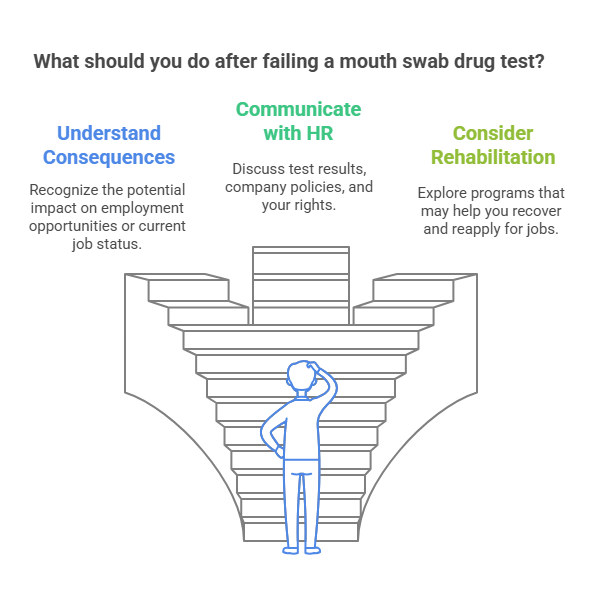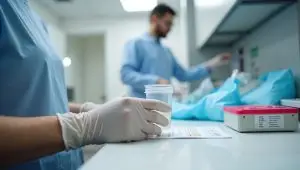So, you've been asked to take a mouth swab drug test and you're freaking out. Don't worry, you're not alone. This type of drug test is one of the more common ones you'll encounter, especially in pre-employment screenings across various industries like healthcare, transportation, retail, and more. Whether you're an employer looking to understand the timeline or a job seeker trying to prepare, we've got you covered. This guide will give you all the info you need to navigate this process confidently.
Key Takeaways
- Mouth swab drug tests are popular due to their simplicity, convenience, and quick results.
- Detection times vary by substance, generally ranging from 24 to 72 hours for most drugs.
- Factors such as frequency of use, metabolism, hydration, and type of substance influence detection times.
- Proper preparation, including oral hygiene and following test guidelines, can help ensure a smoother testing experience.
- Employers and individuals should be aware of their legal rights and the implications of test results, especially regarding confidentiality and contesting inaccurate findings.
Introduction
Mouth swab drug tests are gaining traction for their simplicity, convenience, and effectiveness. As more employers shift towards using these tests for pre-employment screenings and random checks, being well-informed about this process has become critical.
A mouth swab drug test, also known as an oral fluid test, involves collecting saliva from a person's mouth to detect the presence of drugs. It's quick, non-invasive, and can deliver on-the-spot results within minutes. Given its growing popularity, many people have pressing questions about how long various substances can be detected in their saliva, and what factors might impact these detection times.
In this article, we'll dive deep into answering the burning question: "How long does it take to pass a mouth swab drug test?" From understanding general detection times to exploring how individual factors like metabolism and frequency of use come into play, we've got all the insights you need to navigate this process with confidence.

What is a Mouth Swab Drug Test?
A mouth swab drug test, also known as a saliva drug test, is a screening method used to detect the presence of drugs in a person's system through their saliva. It's a straightforward, non-invasive procedure where a cotton swab is rubbed on the inside of the cheek or under the tongue to collect a saliva sample.
Employers favor this method for several reasons. First, it's incredibly convenient—collecting a sample takes just a few seconds, and it can be conducted on-site without specialized equipment. The results are quick, often available within a few hours to a couple of days. Additionally, this type of test is less invasive compared to blood or urine tests, making it a more comfortable experience for the individual being tested.
This test can detect a range of commonly abused substances, including:
- THC (the active ingredient in marijuana)
- Cocaine
- Opiates (such as heroin and prescription painkillers)
- Methamphetamine
- Alcohol
Because of its simplicity and quick turnaround time, the mouth swab drug test has become a preferred choice for pre-employment screenings, random drug tests, and even post-accident checks in various industries.
EXPERT INSIGHT: Hiring the right people for the right position goes beyond just ticking the box in the qualifications checklist—it’s about building a team rooted in trust and honesty that reflects the company’s values and vision. Working in the field of HR for more than a decade now, I can say that the process may be complex, but it’s worth every effort that is being exerted into it. I realized that the people we bring in can make or break the future of the organization. Thus, pre-employment screening is not only a process for legal compliance. It plays a vital role in ensuring that those we choose to hire are not only skilled but also aligned with our culture which will shape our future. - Charm Paz, CHRP
How Long Does It Take to Pass a Mouth Swab Drug Test?
So, you're staring down the barrel of a mouth swab drug test, and the primary question on your mind is, "How long until I can pass this thing?" Well, let’s get straight to it.
General Detection Times
Mouth swab tests can detect a variety of substances, but the detection window isn't the same for everything. Here's a quick rundown:
- THC (cannabis): Generally detected for 24-72 hours.
- Cocaine: Typically shows up for about 24-48 hours.
- Opiates: These can be found in your saliva for around 24-48 hours.
- Methamphetamine: Usually, it's detectable for 24-72 hours.
- Alcohol: This one is on the lower end, usually detectable up to 24 hours.
Remember, these are just general guidelines. Detection times can swing a bit based on a few individual factors.
Factors Influencing Detection Times
Frequency of Use
If you’re a frequent flyer with any of these substances, they’re going to stick around longer in your system. Occasional users generally clear out quicker compared to habitual users who might need extra time to test clean.
Metabolism
Everyone processes substances differently. If you’ve got a fast metabolism, your body will clear out the evidence quicker. A slower metabolism means the opposite. Metabolic rate can make a big difference in how long those telltale traces stay in your saliva.
Hydration and Diet
Think you can speed things up by staying hydrated? Well, you’re not entirely wrong. Drinking plenty of water and maintaining a healthy diet can help your body clear out substances a bit quicker. But remember, it's not a magic bullet.
Type of Substance
Some substances just linger longer than others. For example, THC metabolites are fat-soluble and can stick around longer than other substances which are water-soluble and exit your body faster.
Personal Factors
Age, weight, and overall health—all play roles in how quickly your body can detoxify itself. Younger, healthier individuals with a normal weight range might find their systems clear out substances faster than older or less healthy individuals.
So there you have it. Passing a mouth swab drug test isn't an exact science, but by understanding these detection windows and the factors that influence them, you get a clearer picture and better prepare yourself for that upcoming test.
How to Prepare and What to Expect
Preparing for the Test
Alright, so you're gearing up for a mouth swab drug test, and you want to make sure you're as ready as possible. Here’s a quick and dirty guide to preparing for that swab.
Understand the Guidelines: First off, make sure you know exactly what the test entails. Usually, your employer or testing center will provide some guidelines—read them meticulously. Ignoring these instructions can lead to complications or even a rescheduled test, which nobody wants.
Clean Mouth: This one seems like a no-brainer, but it's worth emphasizing. Brush your teeth thoroughly, including your gums and tongue, a few hours before the test. Use mouthwash too, but don't go overboard. Overdoing it might raise eyebrows and make you look like you're trying to hide something. Stick to your regular brushing and mouthwash routine, just maybe a little more meticulously than usual.
Finally, hydrate. Drink plenty of water to keep your saliva flowing, which can help dilute residues. But, again, moderation is key. Too much water can tip off the test administrators and might lead to retesting under more stringent conditions.
By following these simple steps and keeping your cool, you'll be in the best possible shape for your mouth swab drug test.
During the Test
Alright, so let's break down what you need to know when you're actually taking the test. First off, don't panic. The process is straightforward and usually over in a matter of minutes.
Describe the Process
When it's time for the test, a technician will ask you to open your mouth. They'll use a small, absorbent pad or swab, which looks a lot like a Q-tip. The swab will be rubbed along the inside of your cheeks, gums, and under your tongue. This collects saliva, which is then tested for traces of drugs. The whole swabbing process typically takes less than a minute.
How to Handle the Situation
The best advice here is to stay calm and composed. Stressing out is only going to make you feel worse. Breathe normally and follow the technician's instructions. If you have any questions about the process, don't hesitate to ask them upfront; transparency helps ease anxiety.
There you have it—nothing to stress about. It's routine, quick, and relatively painless. Just keep your cool and you'll get through it just fine.
Legal Considerations and Your Rights
When it comes to mouth swab drug tests, knowing your legal rights is crucial. First off, confidentiality is key. Employers are generally required to handle your test results with strict privacy. They can't just share your information without your consent, so you should feel secure that your details are protected.
Now, let's talk about your right to contest results. If you believe the test results are inaccurate, you have the legal right to challenge them. Often, this can mean requesting a retest, particularly if the initial results could impact your employment status. Employers should outline the steps you need to take to contest the results, so don't hesitate to ask for this information.
Lastly, be aware of the specific employment laws that govern drug testing in your industry. These laws can vary widely depending on where you live and what field you're in. For example, the healthcare and transportation sectors often have stricter regulations. Familiarizing yourself with these can give you an edge and help ensure that your rights are respected throughout the testing process.
What Happens If You Fail?
Failing a mouth swab drug test can feel like the end of the world, but it’s not game over. What happens next largely depends on your specific circumstances and the policies of the organization involved.
Consequences
For job seekers, failing a mouth swab drug test might mean that you don't get the job. Employers often use these tests as a pre-employment screening tool, and a positive result may lead them to reconsider your application. For current employees, the outcome depends on company policy. Some employers may offer support and a chance for rehabilitation, while others may initiate termination, especially in safety-sensitive positions like transportation or healthcare.
Steps to Take
The first step is to talk to HR or the hiring manager. Understanding the test results, company policy, and your rights is crucial. You have the right to request a retest if you believe there was an error. It’s a good idea to request specific results and understand the detection levels for substances.
Keep calm and composed. It’s important to remain professional and express your willingness to comply with company protocols, including participating in any remediation processes they might offer.
Rehabilitation Programs
If you find yourself in this situation, consider rehabilitation programs. Many companies offer Employee Assistance Programs (EAP) that provide resources, counseling, and rehabilitation options. Successfully completing a rehab program may allow you to retake the test or reapply for the position later.
Remember, failing a test doesn’t define you. It’s an opportunity to address any underlying issues and make positive changes. Rehabilitation programs aren’t just about getting you back to work; they’re about getting you back on track.

Cost and Frequency of Testing
Drug testing, including mouth swab tests, comes with its own set of costs and operational considerations. Generally, a mouth swab drug test tends to be on the more affordable side compared to other testing methods like urine or hair follicle tests. For employers, the cost of administering a mouth swab drug test typically ranges between $10 to $50 per test, depending on the complexity and the specific substances being screened for. Bulk orders and agreements with testing companies can sometimes reduce this cost.
In terms of frequency, how often these tests are conducted can vary significantly by industry and specific employer policies. Industries with stringent safety standards, such as transportation and healthcare, are more likely to conduct these tests regularly. For instance, some companies may require testing during the hiring process, after accidents, or even randomly throughout the year to ensure compliance with safety regulations.
Employers might also increase the frequency of tests in cases where there's a higher risk of substance abuse affecting job performance or safety, such as in jobs involving heavy machinery or roles requiring a high level of trust and responsibility. Strategic implementation of these tests, balanced against their cost, can help maintain workplace safety and productivity without imposing undue financial strain.
Related Topics
When diving into the subject of mouth swab drug tests, it's crucial to recognize how this fits into the broader landscape of employment screenings and legal considerations. Here are a few related topics worth exploring:
- Non-CDL DOT Physical Drug Test: If you're involved in the transportation industry but don't require a Commercial Driver's License (CDL), it's still possible you'll need to meet Department of Transportation (DOT) regulations. A non-CDL DOT physical drug test ensures compliance, and understanding this can prepare you for the specific substances tested and the protocols followed.
- Will a DUI Come Up on a Background Check?: If you're wondering about the implications of past legal issues on your employment, this detailed guide covers how a DUI might appear on a background check. Knowledge of this can help you anticipate potential hurdles in job applications and manage the disclosure appropriately.
- Professional Resources for Conducting Background Checks: Organizations like the Professional Background Screening Association (PBSA) and the Society for Human Resource Management (SHRM) are invaluable resources. These platforms offer extensive guidelines and tools for background investigations, including drug testing. They can help HR professionals ensure their processes are ethical, legal, and effective.
By understanding these related areas, you'll gain a more comprehensive view of how mouth swab drug tests fit into the larger picture of employee screening and compliance. Whether you’re a job applicant or an employer, these resources are essential for navigating the complexities of drug testing and background checks.
Frequently Asked Questions
How accurate is a mouth swab drug test?
Mouth swab drug tests are generally very accurate, particularly when administered correctly. They can reliably detect the presence of the most common drugs within their respective detection windows. However, incorrect collection or handling can affect results. Laboratory confirmation can provide an additional layer of accuracy if there are any doubts about the initial screening.
Can mouth swab tests detect recent drug use?
Yes, that’s one of their main advantages. Mouth swab tests are highly effective at detecting recent drug use, typically within a 24 to 72-hour window depending on the substance. This makes them particularly useful for situations where recent impairment needs to be assessed, such as in the workplace or roadside testing.
Are there ways to beat a mouth swab drug test?
While various myths and products claim to help people "beat" mouth swab tests, the effectiveness of these methods is highly questionable. Factors like brushing teeth, using mouthwash, or chewing gum may slightly lower the concentration of drug residues in the mouth, but they are not foolproof. The only guaranteed way to pass is to abstain from drug use.
What should I do if I need a retest?
If you believe that your initial test result was incorrect, most organizations will allow you to request a retest. You should formally contest the results with the entity that conducted the test, providing any relevant evidence or context, such as over-the-counter medications that might have affected the outcome. A laboratory retest, often using a more accurate method like GC/MS (Gas Chromatography/Mass Spectrometry), can then be conducted for verification.
Conclusion
Navigating a mouth swab drug test can seem daunting, but understanding the process and what to expect can significantly ease your concerns. The key points to remember are the typical detection windows for various substances, how personal factors like metabolism and usage frequency can influence these times, and the importance of proper preparation. By adhering to test guidelines and maintaining a calm demeanor during the process, you can approach the test with confidence.
Remember, the ultimate aim of these tests is to promote a safer, healthier, and more productive workplace. Whether you're a job seeker or an employer, embracing the process with this perspective can offer a more positive outlook.
Lastly, knowledge is power. The more you know about drug screening, the better prepared you'll be for any situation that arises. Arm yourself with the information provided here and continue to explore related resources to stay informed. Good luck!

GCheck Editorial Team
Meet the GCheck Editorial Team, your trusted source for insightful and up-to-date information in the world of employment background checks. Committed to delivering the latest trends, best practices, and industry insights, our team is dedicated to keeping you informed.
With a passion for ensuring accuracy, compliance, and efficiency in background screening, we are your go-to experts in the field. Stay tuned for our comprehensive articles, guides, and analysis, designed to empower businesses and individuals with the knowledge they need to make informed decisions.
At GCheck, we're here to guide you through the complexities of background checks, every step of the way.






